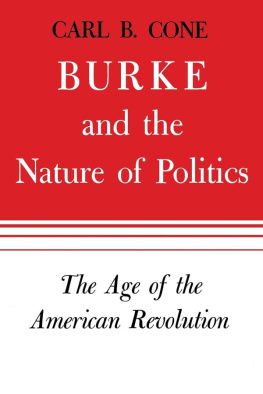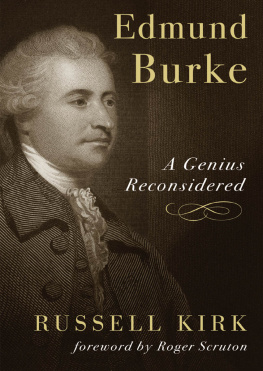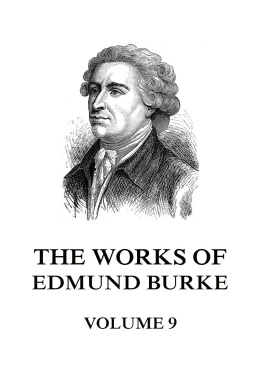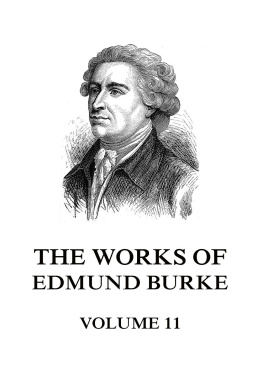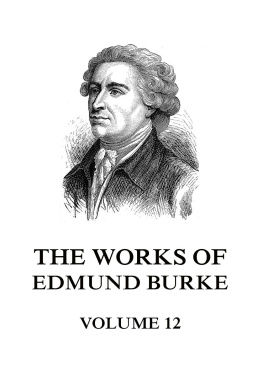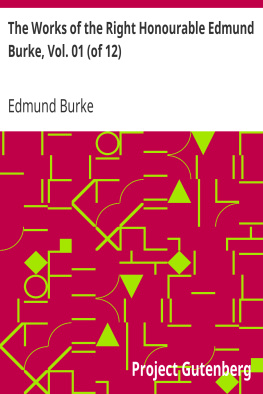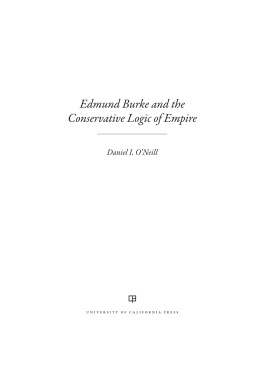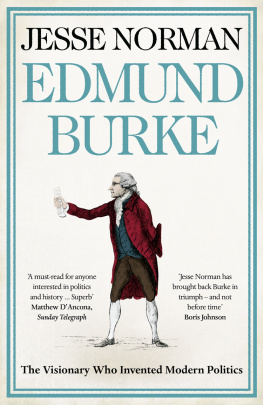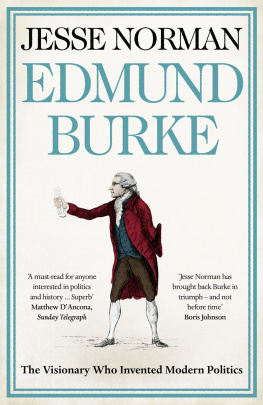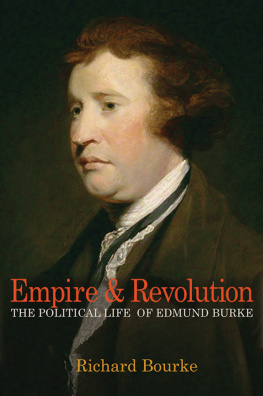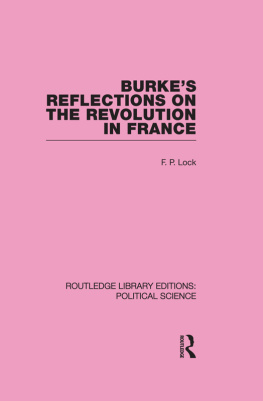Preface
FROM THE TIME of his death in 1797 until 1949, Burkes papers were in private custody. In the possession first of his literary executors and then of the fourth Earl Fitzwilliam, the papers remained the property of the Fitzwilliam family. From them were extracted materials for the sixteen-volume edition of Burkes works published between 1815-1827, and for the four volumes of selected correspondence published in 1844. Sir Philip Magnus in the late 1930s was the first biographer to gain access to the papers, but he employed them sparingly. About the same time the late Dixon Wecter examined the papers for a study of family and financial aspects of Burkes life. With these exceptions the biographers and students of Burkes career before 1949 had to work as they could without benefit of the great collections gathering dust and mold at the Fitzwilliam estates.
In 1949 things changed. The portion of Burkes papers that had been kept at Wentworth Woodhouse in the north was deposited in the Sheffield Central Library on loan from Earl Fitzwilliam and the Trustees of the Fitzwilliam Settled Estates. A smaller collection, formerly at Milton, was placed under similar arrangements in the Northamptonshire Record Office at Lamport Hall. Together these collections comprised the great bulk of original Burke material. Yet many other letters were known in 1949 or have turned up since. Of these, the most important group consists of over a hundred letters from Burke and members of his family to their Irish friend Charles OHara. These have recently been published as part of Professor Ross J. S. Hoffmans Edmund Burke, New York Agent (Philadelphia, 1956).
In writing the present volume I have made use of these three collections. Through the kindness of the present Earl Fitzwilliam and the Trustees of the Fitzwilliam Settled Estates, and through the good offices of Mr. J. P. Lamb, Sheffield City Librarian and Mr. P. I. King, Archivist of the Northamptonshire Record Office, I was enabled to acquire microfilm of the Burke MSS, Sheffield, and photostats of the Burke MSS, Lamport Hall. Dr. R. James Hayes, Director of the National Library of Ireland, kindly supplied me with microfilm of miscellaneous Burke letters in that library and of the letters to OHara so that I studied them prior to the appearance of Professor Hoffmans volume. Mr. G. Ellis Flack, Librarian at the University of Nottingham, graciously provided me with microfilm of Burke letters in the Portland MSS. The other sources that I have used, both manuscript and printed, are indicated in the footnotes.
Yet with good fortune such as no previous biographer of Burke has enjoyed, I have had to be somewhat presumptuous in undertaking my labors. In the views of some persons I am even unwise. They hold that until a scholarly edition of Burkes correspondence has been completed (such an edition under the general editorship of Professor Thomas W. Copeland is now underway) and until detailed studies of various aspects of Burkes career have been made, anyone who attempts a large biography does so at great risk. I am not oblivious to the force of these arguments; still, after studying the Burke papers, I think I have something worthwhile to say. And by saying it now, I may be able to suggest fruitful areas of research to interested scholars. It is unlikely that all the promises of useful special studies of Burke will be fulfilled promptly, and less likely that new ones will not be made. Ones patience cannot exceed his life expectations or his natural timorousness be permitted to stifle ambition.
In the present volume which closes with the year 1782 I present Burke as a party politician rather than as a political philosopher. His activities and his correspondence for this period yield such an interpretation and the opinions of his contemporaries support it. It is inappropriate to attempt systematically to discuss Burkes philosophy when dealing with the period prior to the appearance of his Reflections on the Revolution in France and his Appeal from the New to the Old Whigs. Had Burke died before the French Revolution began, I doubt that we should think of him as a political philosopher. It is enough in this volume to point out anticipations of the philosophy developed by Burke in the works written after 1789.
For advice and assistance I am grateful to the following: the University of Kentucky, which, through its Research Fund Committee, has given financial assistance for travel and the purchase of materials; Donald C. Bryant, Thomas W. Copeland, Ross J. S. Hoffman, Bertram Sarason, and Robert A. Smith, each of whom in ways that he knows has been helpful to me; my colleagues in the Department of History at the University of Kentucky; and my wife for help that need not be explained to authors and cannot be explained to others.
My son Timothy, whether he realizes it or not, had much to do with strengthening my resolution to write this book, and so I dedicate it to him.
Introduction
HAVING FAILED to establish himself in a settled vocation, in 1765 Burke attached himself to the Marquis of Rockingham and won election to the House of Commons. Thus he inaugurated one of the most controversial and spectacular careers in the history of British politics. It lasted not only until his retirement from parliament in 1794, but until his death three years after that, for the press as well as the floor of the House of Commons was Burkes forum. Even in a tranquil age Burkes political life would not have been placid. Nature had endowed him with strong emotions. But the period in which he lived was filled with great issues which aroused Burkes violent passions. Beginning in the 1760s, a succession of crises confronted statesmen who guided the destinies of the British Empire, and every man in public life had to take his stand upon the problems of Ireland, the American colonies, and India. Burke became deeply involved in each of these. Then, in the 1790s, foreshadowed by the rise of individualistic liberalism and political radicalism, appeared challenges to the ancient order of things in the areas of religion, government, and social relationships. In Burkes passionate view, the French Revolution threatened to destroy the Christian civilization of western Europe bound by the chain of human tradition forged by the historical process.
Men reacted to these crises as individuals and as members of organized groups. No man of his generation understood better than Burke how natural and how necessary it was for men of similar opinions to work together to give effect to their beliefs. He also understood that the conflicts between groups would be bitter in proportion to the significance of the issues dividing them. Further he saw that the importance of these groups would be greater in a society like Englands, where there existed a free political life and a legislature which, if not democratic, represented the politically literate elements of the nation.

